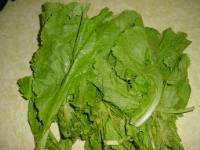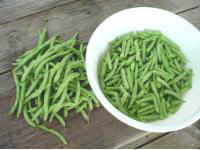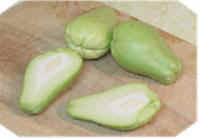Greens
 In South Louisiana we usually start with a little onion
and salt meat lightly browned, smother the greens down in a small amount
of water, add a little seasoning and green onions and we're done. The
core of the leaf is usually removed since it's tough and may have a
bitter taste. My experience is mostly with mustard greens and I grow
them. I like to water them good the day before they're picked, better
yet is a good rain. I find they'll have a less bitter flavor. When
buying greens at the store soak them in water for a couple of hours when
you get them home, it'll help get the bitterness out if there is any.
Collards, Swiss chard and turnip greens are the other southern delights.
In South Louisiana we usually start with a little onion
and salt meat lightly browned, smother the greens down in a small amount
of water, add a little seasoning and green onions and we're done. The
core of the leaf is usually removed since it's tough and may have a
bitter taste. My experience is mostly with mustard greens and I grow
them. I like to water them good the day before they're picked, better
yet is a good rain. I find they'll have a less bitter flavor. When
buying greens at the store soak them in water for a couple of hours when
you get them home, it'll help get the bitterness out if there is any.
Collards, Swiss chard and turnip greens are the other southern delights.Cabbage falls into this category and is grown throughout South Louisiana. Cooking methods are smothered and in cabbage rolls and cabbage casseroles. Cole slaw is another cabbage dish that is popular especially with Southern Fried Chicken.
Beans
Dry bean types that are popular here are the red (kidney) and white beans. Starting with a seasoning meat such as ham hock or salt meat to name a few we'll sauté a little onion, garlic and celery, season it and chow down. Most of the time we'll mash a small portion of the beans to make a sort of creamy body to the dish. Dried beans are soaked for a few hours at least and then cooked on a low fire a couple of hours. That's why we choose red beans to cook on Monday (wash day). You put them on and let em' go. A favorite of mine is a white bean soup. I'll normally take the leftover beans and mash some of them up to make the dish even more creamy, add a little #4 spaghetti and more water and cook it until the spaghetti is done. mmmmm....
 Snap beans are cooked in the traditional meat-onion style and usually
with a few fresh potatoes diced in 1/2" pieces.
Snap beans are cooked in the traditional meat-onion style and usually
with a few fresh potatoes diced in 1/2" pieces. Field (southern) peas are sometimes mixed with snap beans. I'll sometimes throw them right in with a beef roast and cook them together.
Purple Hull Peas are great too.
Baby lima beans are one of my favorites and are cooked in the traditional manner and sometimes a little whole tomato is thrown in (Creole method). Succotash is a dish that uses lima beans and corn cooked together. The lima bean will find its way into my chicken stew also.
Tomatoes
I wish I knew how many backyard gardens contain this Creole treat. Brought here by the Spanish, the tomato has made its way into just about every pot and is a familiar site in Creole dishes. Tomatoes are generally cooked with something and are often used as the base of many dishes such as sauce piquant. Some dishes call for "scorching" the tomato sauce and some do not. Click Here to see what it's all about.
If you have the time to work with them, freshly picked tomatoes make the best bases. To do this blanch the tomatoes in boiling water for about 3 minutes or until the skin starts to soften. Make a slit at the bottom of the tomato before putting it in the water so peeling can be started easier. Take them out, let them cool a little, peel them and dice them up. Now you can start slow cooking them to the consistency you need. Once diced the tomatoes can be bagged in Zip-Locks and frozen for future use.
Finally, tomatoes have an acid in them that can certainly give you heartburn. To remedy this add 1/2 tsp. sugar for each cup of tomato sauce.
Okra
The summer brings forth the okra and it's welcomed with open pots. Smothered, and in gumbo's, the okra holds its own on the dinner table. Boiled and fried okra are big favorites also. With gumbo, the okra is the color and thickening agent (a roux is not normally required but if one is used it's usually small) not to mention the flavor base. A Creole Gumbo is made traditionally with okra and your choice of meat (usually seafood here).
Many people are hesitant to mess with okra because of the slime. Here's a little trick I learned using the microwave. Put the sliced okra in a deep casserole dish with a few tablespoons of water and cover. Microwave on high for about 10 minutes. Carefully (the steam will burn you) open the lid and stir it around. Microwave another 10 minutes and stir again. After two 10 minute sessions reduce the time to 5 minutes. Add a little more water and continue to go through the cook-stir cycles. Do this until the slime disappears. Be careful not to burn it.
Eggplant
I remember as a kid eating eggplant fritters, darn those things were good. Many folks slice, season them up and fry them, and of course, an eggplant casserole and stuffed eggplant are just delicious.
 Mirletons
MirletonsThis puppy is fixed up several ways and I haven't run into any of the dishes that weren't good. Stuffed is really popular usually with ground meat or shrimp. These will work just fine in a casserole also.
Bell Pepper
We certainly can't forget this staple of "the trinity" (Onions, celery and bell pepper). Not only used as a seasoning, we very often stuff them with ground beef or shrimp.
Root Crops
The turnip probably tops the list with root crops followed by Irish and sweet potatoes, carrots and onions.
Turnips complement such things as wild game and many times are served by themselves smothered with onion and seasoned meat.
Sweet potatoes and/or yams, as we incorrectly refer to them, are best served with pork dishes in my opinion. I don't care what they say, they're yams to me! Anyway, baked, cooked in a sugar liquid or creamed with a marshmallow topping, the sweet potato is just great eatin'. We'll also slice them into French fries and fry them sprinkling a little sugar on them after they're done.
Irish (red) potatoes are fried, stuffed with goodies like shrimp, smothered, used in potato salad and the small ones thrown in a pot of boiled crawfish. I'm sure you have your favorite potato dishes as do I.
We're all familiar with the carrot and we use them in many, many dishes. The stock making process incorporates carrots. A dish of carrots and ground meat is also good.
Dry Bulb Onions are nothing but a required vegetable in the Cajun kitchen. If we don't have onions we don't eat! You can run out of milk, eggs and bread but try runnin' out of onions! Onions are the beginning of almost every meal in South Louisiana and are actually in the Lilly family! I could go on listing what onions are used for forever so you can just look at the recipes and figure it out.
Others
Green onions are also a required staple in the kitchen and many a home gardener has these handy in the backyard, at least I do. Green onions, also called scallions, are a seasoning as I see it them and are used primarily at the end of a dish to be cooked only a few minutes. Shallots (sometimes confused with scallions) are larger than scallions and actually form an onion type bulb, scallions don't. They can be used interchangably.
We seldom grow celery here but it's used in many dishes and is part of the "trinity".
Parsley is grown here and can be found in many yard gardens and spices various dishes. Like green onions, parsley is added a few minutes before a dish is done.
Enjoy